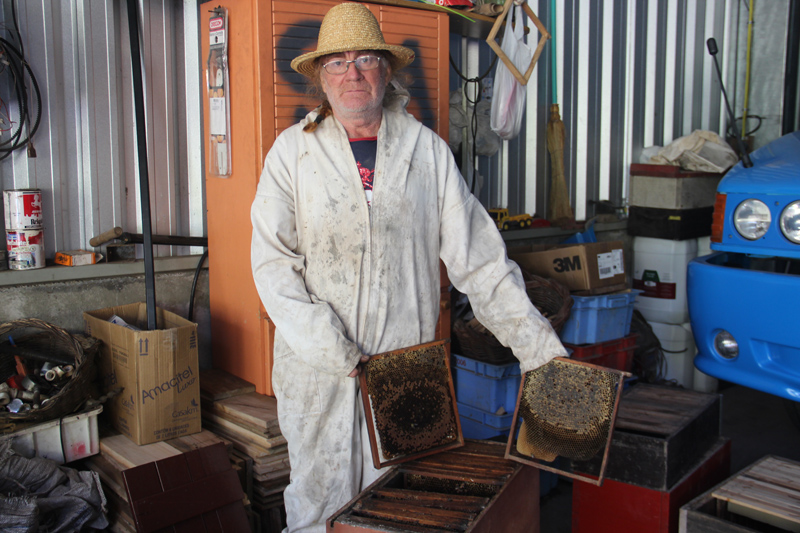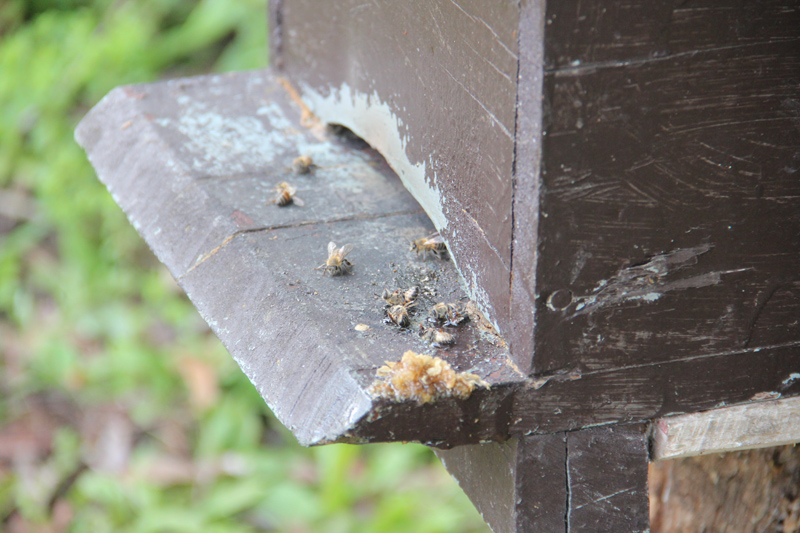
Beekeeper loses about 30 hives for irregular use of insecticides
Situation usually occurs in the same period of the year, which producers are treating the vines. Emater clarifies why and asks for awareness.
a community resident 15 from Graciema, Valley of the Vineyards, in the interior of Bento Gonçalves, is unhappy with a situation that occurred recently. Jaime Cassinelli, 59 years old is a farmer, works mainly with vines. However, also breeds and treats bees. Two weeks ago, was surprised with the mortality of approximately 30 hives, almost 50 that have.
The producer and beekeeper reports that, on the day of the fact, when commuting to work, noticed that there were several dead bees on the floor of the property. just ahead, some come out of the other hives, fall and soon die. Yet, soon, the situation worsened even more. "A day or two later, all appeared dead. The remaining swarms were very weak", the Mint.

It's the second year that Cassinelli has faced the same problem.
This is not the first time that the farmer has faced the situation. Last year, in the same period of the year, Cassinelli lost eight boxes. He suspects that the reason is the poison used to exterminate ants in the region's vines. "We received an inspector from the veterinary inspection who examined all the hives and said that it is not a disease. We open several boxes, he looked and said it was pesticide", the firm.
Although I still can't mention the size of the damage, Cassinelli is also not sure if it will be possible to recover the hives. "We lost the swarm, the honey and we don't know if we'll be able to recover the boxes, because maybe they get poisoned from poison, says.

To wife, Maria Tremarin Cassinelli, 52 years, is also upset. "Nature's greatest wealth is being destroyed by pesticides. Every year, after pruning, a new cycle begins with the treatment of vines and again we have neglect and ignorance with the destruction of those that have the greatest gift of our survival and of all the flowers and fruits in the environment in which we live, that when leaving the hives to do the work of pollinating, do not return and end up dying", stand out.
Maria asks people to be more aware of the environment. "This is very sad. Every nature that God created was destroyed. There will be no more fruit for humanity. Respect these little animals more", ask.
Importance of bees
The rural extensionist of the Technical Assistance and Rural Extension Company (emate), Neiton Perufo enumerates the relevance that bees have for agriculture, mainly for the Serra region. "They are the ones that contribute to the pollination of some varieties of fruit plants that need cross-pollination. Different cultivars of the same species are often unable to produce their own fruit and require pollination. For example, plum, avocado, ultimately, several need", clarify.
Perufo also highlights the exemplary way they work. "Bees are the most organized group in the world. There is a hierarchical organization within the exam., with workers, drones and queens, with its functions very well distributed. There are workers who go to the field to collect pollen, the ones that only take care of the larvae, those that clean the swarm. In addition to adding to the fruit industry, contributes to a range of nutritional and therapeutic functions, like the honey production itself, propolis and royal jelly", stresses.
The danger of insecticides
According to Perufo, the threat of some chemicals, mostly in an uncontrolled way, it's too tall for the bees. "Many times, producers use insecticides that are not registered for that crop, like those used in temporary crops, annuals, soy, corn and bring it to use in the fruit industry, a product that is not registered for use on vines, for example. They are stronger products, that leave residue in that place and unfortunately, the bee has a habit, circle up to three kilometers away from your hive, so the risk is very high when there is indiscriminate use of insecticides", rating.
Mortality in the region
Asked if it is common for bees to die in the region, Perufo says yes. "Unfortunately, every year we receive reports of farmers who have lost swarms.. We go to the place, analysis, checks and it really is for the contamination of pesticides", points.
According to Perufo, the situation occurs mainly in this period of the year, where growers perform winter treatments of vines to control some insects in orchards. "Then, this mortality increases in this winter period, spring", explains.
Awareness is needed
According to Perufo, there is only one way for this situation to be reversed and stop happening.. "With the awareness of the farmer who applies, which uses insecticides. Only he can have this sensitivity, empathy for the neighbor who has beekeeping", the firm.
The professional emphasizes the importance of using the proper products. "Use treatments at the right time, do not apply when there is a high incidence of wind, use only the necessary power, do not bring irregular products, be aware of the chemical groups of insecticides that can cause high mortality, so, those extremely aggressive, that exterminate any type of insect. This awareness the producer must have", ensures.
Besides, Perufo emphasizes the damage that beekeepers have, in situations like this. "Producers here do not have agribusiness, but it is still a source of income, because we know they sell the surplus. So, when these mortalities occur, we have reports of producers who lost 30, until 40 bee boxes. It is a very high loss for those who have, that produces honey and somehow sells. Until I managed to capture a swarm, to form, to create, strengthen so that it can produce, stay and collect honey, it's difficult, laborious, takes a long time to recover everything. It's sad when this happens", says.
what to do when this happens
When a beekeeper is faced with such a situation, you can look for Emater. "Let's go check it out, although we know that 95% or even more of the swarm extermination cases, by the analyzed symptoms, are in fact because of the use of pesticides. So, when occurs, the producer should look for us", ends.
Matter extracted from: https://jornalsemanario.com.br/apicultor-perde-cerca-de-30-colmeias-por-uso-irregular-de-inseticida-na-regiao/ published in 25 September 2021.
Learn more about disappearance of bees.

Sorry, the comment form is closed at this time.